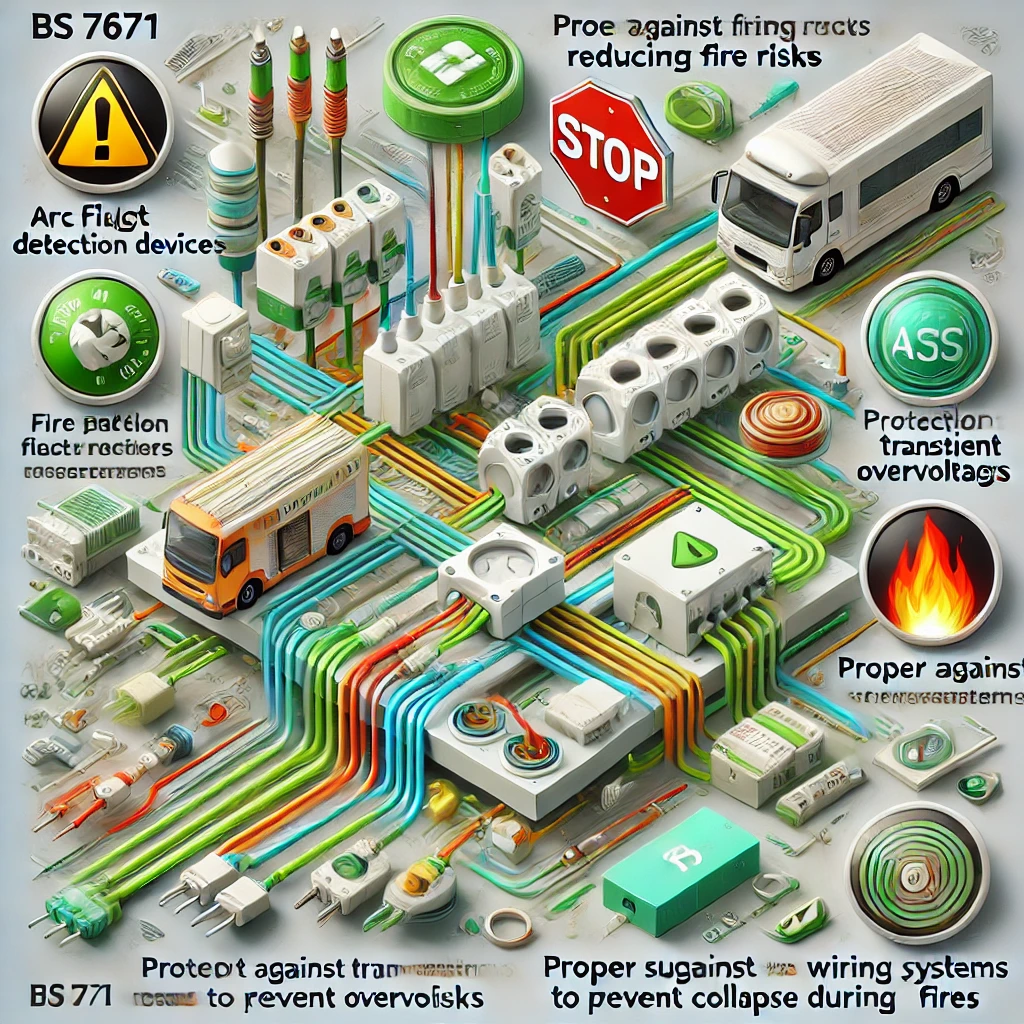The Importance of BS 7671 Understanding the Wiring Regulations
BS 7671, also known as the IET Wiring Regulations, is the national standard in the United Kingdom for electrical installation and the safety of electrical wiring in buildings. Compliance with BS 7671 is essential for electrical professionals to ensure the safety and protection of both people and property. These regulations manage risk and harm by recommending safety devices, providing guidelines for overvoltage protection, ensuring safe isolation and switching procedures, and requiring secure support for wiring systems.BS 7671 regulations ensure the safety and efficiency of electrical installations. Key changes in Chapter 42, Chapter 44, Chapter 46, and Chapter 52 highlight the importance of protection against thermal effects, voltage disturbances, proper isolation, and secure wiring systems.

OW London Electrician and Home Automation Engineers Team
The Importance of BS 7671: Understanding the Wiring Regulations
BS 7671, also known as the IET Wiring Regulations, is the national standard in the United Kingdom for electrical installation and the safety of electrical wiring in buildings. This set of regulations ensures that electrical installations are safe, reliable, and efficient. Compliance with BS 7671 is essential for electrical professionals to ensure the safety and protection of both people and property.
Regulation 421.1.7 states:
"Regulation 421.1.7 has been introduced recommending the installation of arc fault detection devices (AFDDs) to mitigate the risk of fire in AC final circuits of a fixed installation due to the effects of arc fault currents."
This regulation is crucial because AFDDs can detect and isolate faults before they develop into dangerous situations, thereby preventing potential fires and ensuring the safety of electrical installations.
Regulation 443.4 states:
"Protection against transient overvoltages must be provided where the consequence caused by overvoltage:
- (i) could result in serious injury to, or loss of, human life, or
- (ii) could result in interruption of public services/or damage to and cultural heritage, or
- (iii) could result in interruption of commercial or industrial activity, or
- (iv) could affect a large number of co-located individuals."
For other cases, a risk assessment must be performed to determine if protection against transient overvoltages is required. There is an exception not to provide protection for single dwelling units in certain situations.
Chapter 46 states:
"A new Chapter 46 has been introduced. This deals with non-automatic local and remote isolation and switching measures for the prevention or removal of dangers associated with electrical installations or electrically powered equipment. Also, switching for the control of circuits or equipment. Where electrically powered equipment is within the scope of BS EN 60204, only the requirements of that standard apply."
This regulation ensures that appropriate measures are in place for safely isolating and switching off electrical equipment, reducing the risk of accidents and ensuring the safety of maintenance personnel.
Regulation 521.10.202 states:
"Regulation 521.10.202, which gives requirements for the methods of support of wiring systems, has replaced Regulation 521.11.201. This is a significant change. Regulation 521.10.202 requires cables to be adequately supported against their premature collapse in the event of a fire and applies throughout the installation, not just in escape routes as previously."
This change ensures that wiring systems remain secure during a fire, providing a safer environment for evacuation and emergency response.

Frequently Asked Questions
Q: What devices are recommended for mitigating the risk of fire in AC final circuits?
A: According to BS 7671 Regulation 421.1.7, the installation of arc fault detection devices (AFDDs) is recommended to mitigate the risk of fire in AC final circuits of a fixed installation due to the effects of arc fault currents.
Q: When must protection against transient overvoltages be provided?
A: Regulation 443.4 of BS 7671 states that protection against transient overvoltages must be provided where the consequence caused by overvoltage could result in serious injury or loss of human life, interruption of public services or damage to cultural heritage, interruption of commercial or industrial activity, or affect a large number of co-located individuals.
Q: What new chapter deals with non-automatic isolation and switching measures?
A: Chapter 46 of BS 7671 deals with non-automatic local and remote isolation and switching measures for the prevention or removal of dangers associated with electrical installations or electrically powered equipment.
Q: What is the significance of Regulation 521.10.202 in BS 7671?
What users Saying
Discover what our customers think about our services. Their feedback reflects our commitment to delivering exceptional service and expert solutions for all electrical and security needs.

